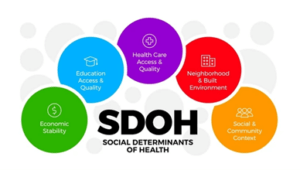Are you using the SDoH codes yet in your office? You should be.
We shouldn’t view them as one more item that adds to the documentation burden for providers. Evidence shows that social determinants influence a person’s health more than genetic factors or access to healthcare services. By assessing and documenting SDoH, you can help your patients today by getting them the resources they need to improve and maintain their physical and emotional health.
So, let’s take a quick refresher on this critical topic.
Examples of SDoH include:
- Safe housing, transportation, and neighborhoods
- Racism, discrimination, and violence
- Education, job opportunities, and income
- Access to nutritious foods and physical activity opportunities
- Polluted air and water
- Language and literacy skills
The Screening Code
CMS established a standalone code, G0136 (an HCPCS code), to assess SDoH. They define SDoH by broad groups: “economic stability, education access and quality, neighborhood and built environment, and social and community context, which include factors like how soon, food and nutrition access, and transportation needs.”
The assessment involves a standardized questionnaire with 26 questions (see below for a link to the screening tool).[1] It relates to the social risk factors that would affect the diagnosis and treatment of the patient, and the questions cover everything from living situations to exercise, substance abuse, financial strain, family and community support, and mental health. They can take as little as five minutes to complete (and should take no more than 15 minutes).
You should complete this assessment every six months to ensure that you capture changes in the patient’s SDoH.
There is not enough space here to list all the actual ICD-10 codes for SDoH (the Z-codes). But here are the categories:
- Z55 problems related to education and literacy
- Z56 Problems related to employment and unemployment
- Z57 Occupational exposure to risk factors
- Z58 Problems related to physical environment
- Z59 Problems related to housing and economic circumstances
- Z60 Problems related to social environment
- Z62 Problems related to upbringing
- Z63 Other problems related to primary support group, including family circumstances
- Z64 Problems related to certain psychosocial circumstances
- Z65 Problems related to other psychosocial circumstances
For a list of all the Z-codes (including updates for 2024), go here: https://www.cms.gov/medicare/coding-billing/icd-10-codes/2024-icd-10-cm
[1] https://www.cms.gov/priorities/innovation/files/worksheets/ahcm-screeningtool.pdf
Got a question about E/M coding? We’d love to hear from you.
Submit your questions by emailing us at coders@calmwatersai.com


Michelle Sergei-Casiano

